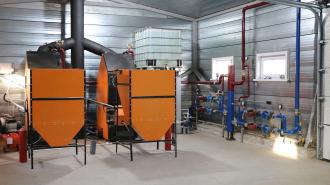Successful utilization of biomass in North Kazakhstan region

Track with bales goes to production facility at North Kazakhstan region
North Kazakhstan region shows successful examples of the implementation of circular economy principles through the utilization of wood and agricultural waste, also known as biomass. Local enterprises are actively using wood and agricultural wastes for heat supply, reducing the ecological footprint, and increasing economic efficiency.

In the village of Beskol in the North Kazakhstan region, the installation of a modular biomass boiler house helped the school-college to solve the problem of low temperatures in the classrooms. Previously, the school-college was connected to a district heating system that did not provide the required amount of heat. Measures were taken to insulate the building, including replacing windows, insulating doors and openings, and repairing side entrances, but these did not completely solve the problem. The situation changed after the installation of the modular biomass boiler house, which, together with the measures taken, ensured a comfortable indoor temperature. Biomass heating proved to be twice as favourable as district heating.
Schoolchidren of Beskol school-college, North Kazakhstan region
Annually, Kazakhstan consumes approximately 11 million tonnes of coal for municipal needs, which leads to emissions of heavy metals and greenhouse gases.
In the North Kazakhstan region, several enterprises are already processing sawdust and straw into fuel briquettes used for heating. This not only reduces costs but also helps to improve the environmental situation and increase the quality of life for local residents. Olga Dumanskaya, a resident of the village of Bulaevo, noted the positive effects of using biomass briquettes: "I have been heating with coal and wood all my life. It makes the air heavy, full of soot and ash; maybe that's why I often get sick. But now there will be no more ash and soot," says Olga.

Olga Dumanskaya, a resident of the village of Bulaevo, uses biomass briquettes for cooking
UNDP research showed that the largest amount of agricultural waste is generated in the Akmola, Kostanay and North Kazakhstan regions. The total available amount of agricultural waste in these three regions of the country is 2,5 million tonnes of straw, which is equivalent to 2 million tonnes of coal. Instead of burning, dumping, or simply rotting in the field, wood and agricultural waste can be used to generate heat.
One such example is a company in the city of Mamlyutka that produces and processes grain. They used diesel fuel to dry grain and spent over 140 million tenge annually. In addition to grain, the company also grows flax. By recycling flax straw into bales and using them for heating, the company has significantly reduced its costs and improved the environmental situation. "Using flax straw bales for heating is very economical and beneficial for our company, as we grow the flax ourselves. Flax straw is not suitable as animal feed, so it is collected in the field, pressed into bales and taken to our production facility, where we use it as fuel for boilers," explains Askar Kakimov, an employee of Agrofirma Mamlyutskaya LLP.
At Agrofirma Mamlyutskaya LLP, North-Kazakhstan region (1) Azamat Kakimov, an employee (2) Biomass boilers (3-5) Agricultural wastes pressed into bales
For small and medium-sized enterprises, waste utilization and the use of biomass also offer economic and production-related advantages, as they reduce operating costs, improve energy security, and create comfortable conditions for employees.
Biomass boilers have been installed at the Dikanshy company in Petropavlovsk, which processes and exports organic agricultural products. The company also processes waste from a nearby plywood workshop into pellets. "Our company endeavours to use various innovative approaches at all stages of production. We used to be connected to the district heating system, but to reduce costs we switched to biomass boilers. We opted for fuel because we know that there is a lot of it left over in the nearby plywood workshop. It is also almost impossible to recycle. In our company, we have tried to make pellets from this dust, which we then used for the boilers. Now we are planning to purchase special equipment and set up pellet production, primarily for our own use," says Vyacheslav Sutulov, Head of Finance at Dikanshy LLP.
At Dikanshy LLP, North-Kazakhstan region (1) Zhanna Solotko, an employee (2-4) Pellet boilers
Examples of biomass utilization in the North Kazakhstan region show how circular economy approaches combined with green technologies support local production and promote a more rational use of resources, improving the quality of life of local communities.

 Locations
Locations
































